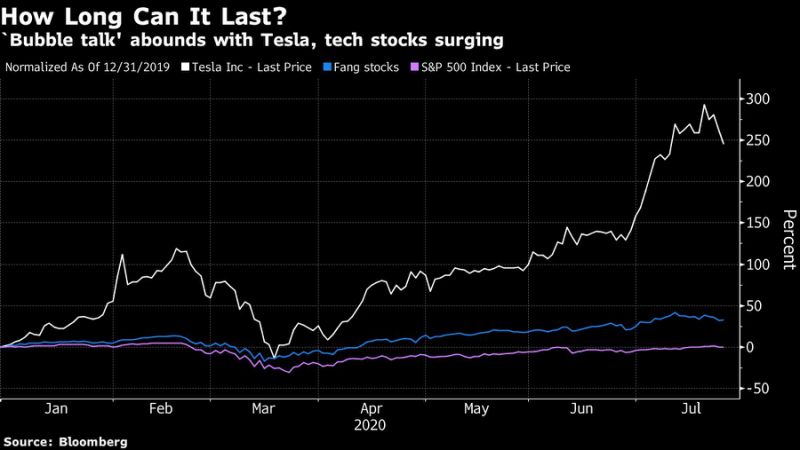
Rob Arnott has a warning for everyone who is confident they’ll know when it’s time to sell a soaring stock like Amazon.com Inc. or Tesla Inc.: getting out before the crash is much harder than it looks.
“People buying bubble assets will make money until they don’t,” the Research Affiliates co-founder said on Bloomberg’s What Goes Up podcast. “If they don’t have a view of what will it take for me to say, ‘OK, enough already, I’m going to get out,’ then they are doomed to ride the roller-coaster over the top and down. So without a sell discipline, buying bubble assets is insanely stupid.”
After a stellar run for technology stocks this year, with the Nasdaq 100 up more than 25% at one time, speculative trading sending the likes of bankruptcy stocks soaring and shares of Tesla surging nearly 300%, comparisons of elements of 2020 to the dot-com days have grown louder. The concern is that today will end catastrophically as it did then, with a bubble eventually bursting, burning those who have enjoyed the historic rebound from the depths of the coronavirus bear-market.
Research Affiliates, a smart-beta pioneer and sub-adviser to money managers including Pacific Investment Management Co., has studied the nature of bubbles for years. In an April 2018 report titled, “Yes. It’s a Bubble. So What?”, Arnott listed several evidences at the time — including tech, crypto-currencies and so-called micro-bubbles in certain stocks including Tesla — but urged investors be patient.
Arnott notes it’s not possible to time when a bubble starts or will end, though he says investors can define and identify them in real-time. The one-time editor in chief of Financial Analysts Journal provides a two-part definition. First, you’d have to use “implausible assumptions” to justify valuation multiples. Second, “the marginal buyer, the person who’s buying at today’s prices, doesn’t care about valuation models at all,” he told What Goes Up co-hosts Michael Regan and Sarah Ponczek.
Take Tesla, for example. The electric-vehicle maker sports a higher valuation than the entire U.S. auto industry excluding Tesla, and is valued at more than twice the value of Toyota Motor Corp., Arnott said. To justify the high price-tag, Tesla’s revenues would have to be comparable to sales of all those companies combined — a scenario that’s possible, but not plausible, in his view.
“I would note that I have never shorted Tesla — I’ve thought it was overpriced since it was a lot cheaper than current levels. At $300 level I was thinking it’s a short,” he said. “But I’ve never shorted it for the very simple reason that bubbles can continue longer than you can possibly imagine.”
Back in early April, Research Affiliates’ chief investment officer, Chris Brightman, said the drastic selloff had forced a rethink of the firm’s previous bearish bent, moving from a defensive stance to one that was more so risk-on. But already, “a lot has changed,” Arnott said in the Thursday interview, and the Newport Beach, California,-based firm has been moving back toward a defensive disposition.
“We’re reluctant to go fully to a defensive posture until this next stimulus bill gets negotiated and passed and starts to work its way into the economy,” Arnott said. “Do I think some of the stimulus will make its way into the capital markets? Of course, yes. And so, does that push the market higher? Very possibly, yes. Or at least it props it up at levels that don’t make economic sense.”
Still, Arnott, an investor of the “smart-beta” philosophy of weighing indexes according to traits like cheapness and momentum instead of market capitalization, is stunned by the gaping divide between value and growth stocks. By valuation measures including price-to-sales or price-to-book, growth stocks are more expensive today versus value than they were in 2000.
Arnott’s work shows that in bear markets caused by the bursting of an asset bubble, “value wins big.” For example, after the tech bubble of 2000 or Nifty 50 burst in the 1970s. However, when a bear market is caused by a macroeconomic shock, like the global financial crisis, value tends to perform as badly as the broader stock market or worse.
“What do we have now? We have macroeconomic driven bear market and the bubble has not yet burst,” Arnott said. “So if we have a second leg to the bear market, my prediction would be that it will be a bubble bursting portion of the bear market.”
